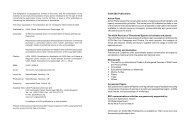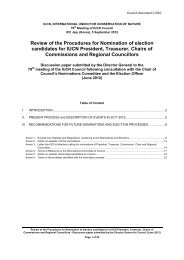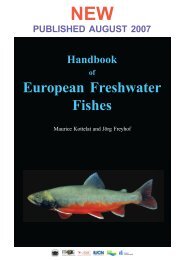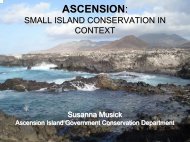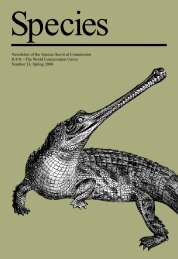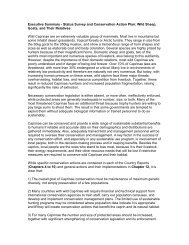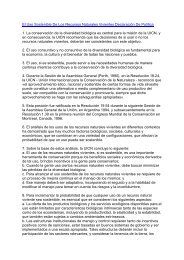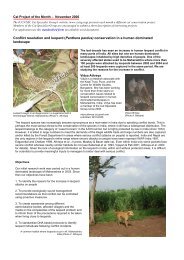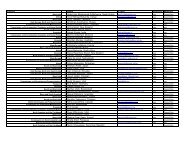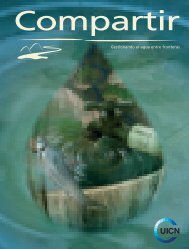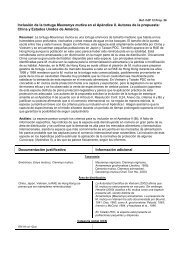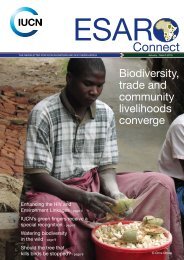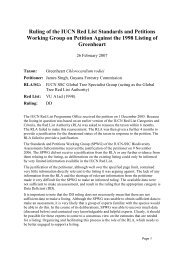Planning education to care for the earth - IUCN Knowledge Network
Planning education to care for the earth - IUCN Knowledge Network
Planning education to care for the earth - IUCN Knowledge Network
You also want an ePaper? Increase the reach of your titles
YUMPU automatically turns print PDFs into web optimized ePapers that Google loves.
Pllanning <strong>education</strong> <strong>to</strong> <strong>care</strong> <strong>for</strong> <strong>the</strong> <strong>earth</strong>Influences on pro-environmental practicesJoy A. PalmerAbstractCertain experiences are shown <strong>to</strong> have influenced pro-environmentalbehaviours in a study of UK environmental educa<strong>to</strong>rs. The results arecompared with a similar study in <strong>the</strong> USA. Have schools beeninfluential? What is <strong>the</strong> role of family and outdoor activities? Theimplications of <strong>the</strong> study <strong>to</strong> policies and practices in <strong>the</strong> UK aredescribed.Those responsible <strong>for</strong> organising and implementing <strong>education</strong> andcommunication programmes which are intended <strong>to</strong> help people learn aboutand <strong>care</strong> <strong>for</strong> <strong>the</strong> environment should certainly know something aboutlearning experiences that produce active and in<strong>for</strong>med minds. This chapterwill attempt <strong>to</strong> give some understanding of <strong>the</strong> influences and experienceswhich develop pro-environmental behaviours.A research study in <strong>the</strong> United States by Tanner (1980) highlighted lifeexperiences that produce adults who are in<strong>for</strong>med about and activelypromote environmentally positive behaviour. Conservationists were asked <strong>to</strong>identify <strong>the</strong> <strong>for</strong>mative influences that led <strong>the</strong>m <strong>to</strong> choose conservation work.Youthful experiences of <strong>the</strong> outdoors and of pristine environments emergedas <strong>the</strong> most dominant influence, supporting Tanner’s hypo<strong>the</strong>sis (1974a,1974b) that children must first come <strong>to</strong> know and love <strong>the</strong> natural worldbe<strong>for</strong>e <strong>the</strong>y can become concerned with its <strong>care</strong>.Following on from this work, Palmer (1993) generated data about <strong>for</strong>mativeexperiences and environmental concern from a larger sample of adults.This study focused on environmental educa<strong>to</strong>rs - a group of active andin<strong>for</strong>med citizens who know about and <strong>care</strong> <strong>for</strong> <strong>the</strong> environment in <strong>the</strong>iradult lives. An outline of <strong>the</strong> study was sent <strong>to</strong> members of <strong>the</strong> NationalAssociation <strong>for</strong> Environmental Education in <strong>the</strong> United Kingdom. Theywere asked <strong>to</strong> provide <strong>the</strong>ir age, gender, details of <strong>the</strong>ir demonstration ofpractical concern <strong>for</strong> <strong>the</strong> environment, and an au<strong>to</strong>biographical statementidentifying <strong>the</strong> experiences which had led <strong>to</strong> that concern. They were alsoasked <strong>to</strong> recount what <strong>the</strong>y considered <strong>to</strong> be <strong>the</strong>ir most significant lifeexperience and <strong>to</strong> write a statement indicating which, if any, of <strong>the</strong> years of<strong>the</strong>ir lives were particularly memorable in <strong>the</strong> development of positiveattitudes <strong>to</strong>wards <strong>the</strong> environment. Only <strong>the</strong> aims and purposes of <strong>the</strong>research were notified <strong>to</strong> participants so that <strong>the</strong>y were able <strong>to</strong> providecompletely original responses that had not been biased by suppliedexamples.3



